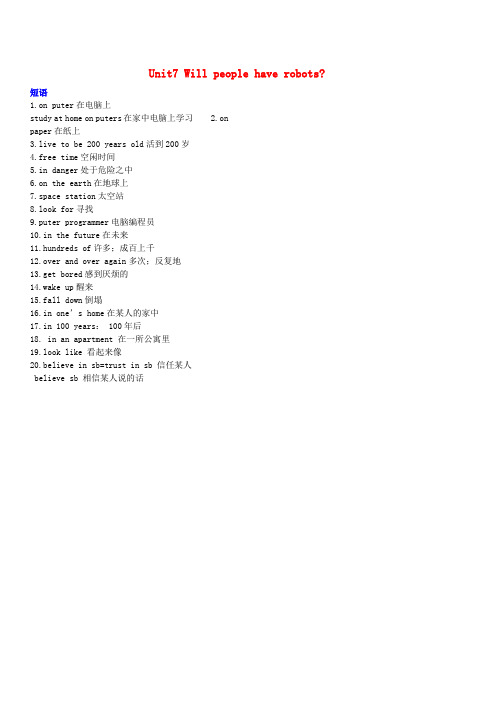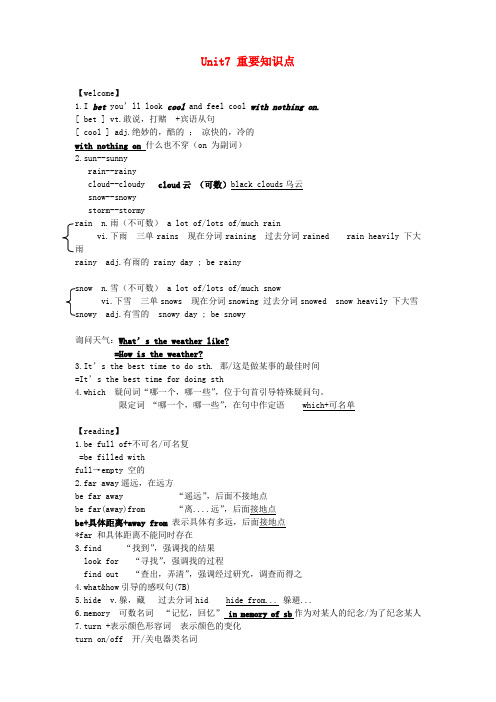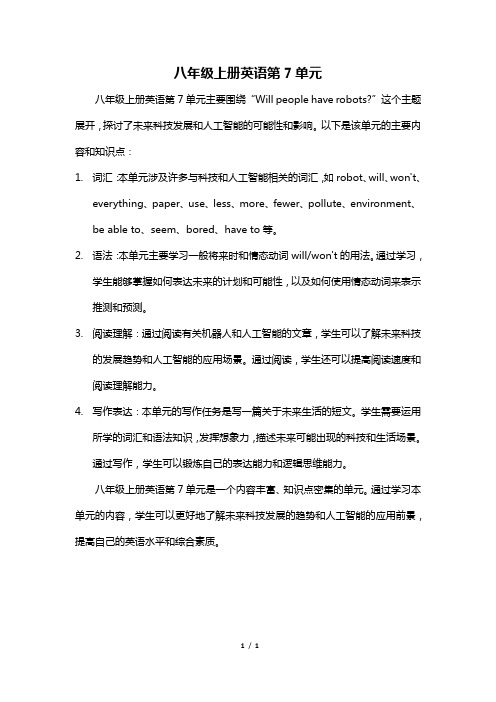八年级上册英语Unit7知识点总结
人教版八年级上册英语 Unit 7单元知识点总结

人教版八年级上册英语Unit 7单元知识点总结Unit 7 Will people have robots?知识点1. Do you think…? 你认为……?后常接宾语从句,宾语从句要用陈述句的语序。
例:Do you think there will be more pollution in the future?宾语从句特殊疑问词+ do you think+陈述语序2.paper纸不可数名词一张纸a piece of paper报纸,论文,试卷可数名词3. live to be + 年龄= live to +年龄= live the age of + 年龄活到多少岁live to do sth. 为做某事而活着。
后面的不定式表目的。
live v. 第三人称单数lives /liviz/;life n. 复数形式lives /laivz/living adj. 活着的作定语和表语alive adj. 活着的只作表语例:a living man (定语) The man is living (表语,放在be动词后面) The man is alive (表语)4. in 100 years 在100年以后in + 一段时间在……之后一般将来时,对其提问用how soon (多久)5. part n. 参加,参与;部分take part in = join in 参加play a part in sth./ doing sth. 参与到……中去;在……中扮演着……的角色6. human n. 人复数(pl.) humansadj. human being =humanperson 个体的人,有单复数形式,“一个人”只能说“a person”,不能说“a people”。
people 人,人们集体,为一个集合名词;也可作“民族”,此时有单复数,a people 指“一个民族”,所以它的复数就是“peoples”。
八年级上册英语第七单元知识点

八年级上册英语第七单元知识点八年级上册英语第七单元的知识点主要包括以下内容(具体内容可能因不同版本的教材而有所差异):
一、词汇
学习并掌握本单元的新单词、短语及其用法,如有关描述人物特征、个性、习惯等方面的词汇。
二、语法
1. 比较级和最高级:本单元可能会重点讲解形容词和副词的比较级和最高级的构成及用法,包括规则变化和不规则变化。
2. 一般现在时:复习和巩固一般现在时的用法,特别是第三人称单数的动词变化。
3. 情态动词:可能会涉及情态动词如should, could, might等的用法。
三、句型
1. 学习并掌握本单元的重点句型,特别是与人物描述、比较、建议等相关的句型。
2. 掌握如何用英语描述人的外貌、性格、能力等。
四、阅读
通过阅读本单元的课文,提高阅读理解能力,学习如何获取文章中的关键信息,并理解文章的主旨大意。
五、写作
学习如何用英语写一篇描述人物的文章,包括描述人物的外貌、性格、爱好、习惯等方面。
六、听力和口语
通过听力和口语练习,提高听懂和用英语描述人物的能力,包括听懂有关人物描述的对话和短文,以及能够用英语进行简单的人物描述。
请注意,以上只是可能的知识点概述,具体的学习内容应以您所使用的教材为准。
建议您参考教材、教辅资料或咨询教师以获取更详细和准确的信息。
八年级英语上册Unit7Willpeoplehaverobots知识点归纳(新版)

Unit7 Will people have robots?短语1.on puter在电脑上study at home on puters在家中电脑上学习 2.onpaper在纸上3.live to be 200 years old活到200岁4.free time空闲时间5.in danger处于危险之中6.on the earth在地球上7.space station太空站8.look for寻找9.puter programmer电脑编程员10.in the future在未来11.hundreds of许多;成百上千12.over and over again多次;反复地13.get bored感到厌烦的14.wake up醒来15.fall down倒塌16.in one’s home在某人的家中17.in 100 years: 100年后18. in an apartment 在一所公寓里19.look like 看起来像20.believe in sb=trust in sb 信任某人believe sb 相信某人说的话用法:1.will+动词原形将要做……2.fewer/more+可数名词复数更少/更多……less/more+不可数名词更少/更多……3.have to do sth.不得不做某事(客观) must 必须(主观)5.There will be + 主语+其他将会有……6.There is/are +sb./sth.+doing sth.有……正在做某事7.make sb. do sth. 8.help sb. with sth.帮助某人做某事9.What will the future be like ? 未来将会是什么样子?10.Which side do you agree with ?你同意哪一方的观点?。
八年级英语上册Unit7Seasons重要知识点

Unit7 重要知识点【welcome】1.I bet you’ll look cool and feel cool with nothing on.[ bet ] vt.敢说,打赌 +宾语从句[ cool ] adj.绝妙的,酷的;凉快的,冷的with nothing on什么也不穿(on 为副词)2.sun--sunnyrain--rainycloud--cloudy cloud云(可数)black clouds乌云snow--snowystorm--stormyrain n.雨(不可数) a lot of/lots of/much rainvi.下雨三单rains 现在分词raining 过去分词rained rain heavily 下大雨rainy adj.有雨的 rainy day ; be rainysnow n.雪(不可数) a lot of/lots of/much snowvi.下雪三单snows 现在分词snowing 过去分词snowed snow heavily 下大雪snowy adj.有雪的 snowy day ; be snowy询问天气:What’s the weather like?=How is the weather?3.It’s the best time to do sth. 那/这是做某事的最佳时间=It’s the best time for doing sth4.which 疑问词“哪一个,哪一些”,位于句首引导特殊疑问句。
限定词“哪一个,哪一些”,在句中作定语 which+可名单【reading】1.be full of+不可名/可名复=be filled withfull→empty 空的2.far away遥远,在远方be far away “遥远”,后面不接地点be far(away)from “离....远”,后面接地点be+具体距离+away from表示具体有多远,后面接地点*far 和具体距离不能同时存在3.find “找到”,强调找的结果look for “寻找”,强调找的过程find out “查出,弄清”,强调经过研究,调查而得之4.what&how引导的感叹句(7B)5.hide v.躲,藏过去分词hid hide from... 躲避...6.memory 可数名词“记忆,回忆” in memory of sb作为对某人的纪念/为了纪念某人7.turn +表示颜色形容词表示颜色的变化turn on/off 开/关电器类名词turn up/down 调高/低音量It’s one’8.fall vi.落,降落,下落过去分词:fellvi.降临,来临 The teachers’ Day falls on Monday this year, vi.跌倒 fall down摔倒;倒塌fall over摔倒fall off=fall down from 从...跌落9.pile 可数名词“一堆” a pile of...一堆...动词“堆起” He piled a lot of books on the grass.10.upon=on prep.在...上11.As the days are shorter and the temperature drops.①as 连词“当...时;随着”,引导时间状语从句②take one’s temperature给某人量体温提问:What③drop vi.下降(相当于fall)13.rise vi.上升;升起正上方15.Farmers are busy harvesting crops,be busy with sth忙于某事be busy doing sth 忙于做某事【grammar】1.different adj.不同的 be different from... ↔be the same asdifference n.差异 the difference between A and B A和B 之间的差异2.give vt.给 give sb sth=give sth to sb3.make sth for sb为某人做某物4.wake up叫醒;醒来表示“唤醒某人”时:名随代中5.catch /have/ get a cold患感冒6.have a fever发烧have a try试一下have a swim游泳have a walk散步have a rest休息have a look看一看have a talk谈话7.cough a lot咳得厉害[ a lot ] 非常,十分相当于much/very much,常用来修饰动词、形容词或副词的比较级,在句子中作程度状语。
八年级上册英语第7单元

八年级上册英语第7单元
八年级上册英语第7单元主要围绕“Will people have robots?”这个主题展开,探讨了未来科技发展和人工智能的可能性和影响。
以下是该单元的主要内容和知识点:
1.词汇:本单元涉及许多与科技和人工智能相关的词汇,如robot、will、won't、
everything、paper、use、less、more、fewer、pollute、environment、be able to、seem、bored、have to等。
2.语法:本单元主要学习一般将来时和情态动词will/won't的用法。
通过学习,
学生能够掌握如何表达未来的计划和可能性,以及如何使用情态动词来表示推测和预测。
3.阅读理解:通过阅读有关机器人和人工智能的文章,学生可以了解未来科技
的发展趋势和人工智能的应用场景。
通过阅读,学生还可以提高阅读速度和阅读理解能力。
4.写作表达:本单元的写作任务是写一篇关于未来生活的短文。
学生需要运用
所学的词汇和语法知识,发挥想象力,描述未来可能出现的科技和生活场景。
通过写作,学生可以锻炼自己的表达能力和逻辑思维能力。
八年级上册英语第7单元是一个内容丰富、知识点密集的单元。
通过学习本单元的内容,学生可以更好地了解未来科技发展的趋势和人工智能的应用前景,提高自己的英语水平和综合素质。
1/ 1。
人教版八年级上册英语 Unit 7单元知识点总结

Unit 7 Will people have robots?知识点1. Do you think…?你认为……?后常接宾语从句,宾语从句要用陈述句的语序。
例:Do you think there will be more pollution in the future?宾语从句特殊疑问词+ do you think+陈述语序2. paper纸不可数名词一张纸a piece of paper报纸,论文,试卷可数名词3. live to be + 年龄= live to +年龄= live the age of + 年龄活到多少岁live to do sth. 为做某事而活着。
后面的不定式表目的。
live v. 第三人称单数lives /liviz/;life n. 复数形式lives /laivz/living adj. 活着的作定语和表语alive adj. 活着的只作表语例:a living man (定语) The man is living (表语,放在 be 动词后面) The man is alive (表语)4. in 100 years 在 100 年以后in + 一段时间在……之后一般将来时,对其提问用 how soon (多久)take part in = join in 参加play a part in sth./ doing sth. 参与到……中去;在……中扮演着……的角色6. human n. 人复数(pl.) humansadj. human being =humanperson 个体的人,有单复数形式,“一个人”只能说“a person”,不能说“a people”。
people 人,人们集体,为一个集合名词;也可作“民族”,此时有单复数,a people 指“一个民族”,所以它的复数就是“peoples”。
7. such adj. 这样的such+ a/an+ adj. + 单数可数名词such + adj. + 复数可数名词/不可数名词so adj. so + adj./ adv. + 复数名词/不可数名词so + adj. + a/an + 单数可数名词such + a/an + adj. + 单数可数名词= so + adj. + a/an + 单数可数名词8. It is + adj. + for sb. to do sth. 做某事对某人而言是……此句型中的“it”为形式主语,真正的主语为不定式短语比较 It is + adj. + for sb. to do sth.与 It is + adj. + of sb. to do sth.(这里的形容词是描述事物性质的 ) (这里的形容词是表示人的性格特征或品质,如clever,kind, nice, good,foolish 等)It is + adj. + for sb. to do sth. 句式还可以与动名词作主语的句式相互替换。
八年级英语上册Unit7短语语法知识点汇总(人教新目标版)
Unit 7 Will people have robots一、必背短语。
二、重点结构1.will+动词原形将要做……2.fewer/more+可数名词复数更少/更多……less/more+不可数名词更少/更多……3.have to do sth.不得不做某事(客观)must 必须(主观)4.agree with sb. 同意某人的意见5.There will be + 主语+其他将会有……=There be going to be…6.There is/are +sb./sth.+doing sth. 有……正在做某事7.make sb. do sth. 使某人做某事8.help sb. with sth. 帮助某人做某事9.What will the future be like ? 未来将会是什么样子?10.Which side do you agree with ? 你同意哪一方的观点?【教材内容解析】Section A1.Do you think there will be robots in people’s homes? (P. 49)本句是主从复合句,从句为宾语从句,如果do you think放在句中,则为插入语,放在特殊疑问词后面,结构为:疑问词+do you think+主语+谓语+其它。
例句:Which do you think is the best movie theatre?2.People will l ive to be 200 years old. (P. 49)live to be+基数词+years old意为“活到……岁”。
例句:In the story, people will live to be 500 years old.3.Will people use money in 100 years? (P. 49)“in+一段时间”表示“在……之后”或“在……之内”,通常用于一般将来时,常用来回答how soon的提问;“for+一段时间”则表示持续多长时间,用来回答how long的提问。
人教版八年级上册英语 知识点语法归纳总结 Unit 7
Unit 7 Will people have robots?1.短语归纳2.典句必背3.用法集萃(1)Do you think there will be robots in people’s homes? 你觉得人们家里会有机器人吗?❖there will be是there be的一般将来时,结构是“There will be+主语+其他”。
There be的一般将来时结构还可以是“There is/are going to be+主语+其他”。
例:There will be more flowers. 将会有更多的花。
There is going to be a basketball match this afternoon. 今天下午会有一场篮球比赛。
❖ There will be 的句式变化有:(2) Will people use money in 100 years? 一百年后人们还会用钱吗? ❖ in 100 years 意为“在一百年之后”。
“in+一段时间”表示“在...(时间)之后”,常用于一般将来时的句子中, 提问“in+表示一段时间的词”时用how soon 或when。
例:—How soon/ When will they return? 他们过多久/什么时候返回?—In three weeks. 三周后。
My father will be back in a week. 我爸爸一周后回来。
❖ 拓展 ❖ 辨析:in, after, later(3) Everyone should play a part in saving the earth. 每一个人都应当尽一份力来拯救地球。
❖ play a part 意为“参与(某事)”,play a part in doing sth. 意为“参与做某事”。
❖ play a part in 还可以指“在...中起作用”,相当于play a role in 。
人教版英语八年级上册Unit7单词+课文+知识梳理
人教版英语八年级上册Unit7单词音频+课文音频+知识梳理01Unit7 单词paper['peɪpər] 纸pollution [pə'luːʃn] 污染;污染物prediction[prɪ'dɪkʃn]预测future ['fjuːtʃər] 未来pollute[pə'luːt] 污染environment [ɪn'vaɪrənmənt] 环境planet ['plænɪt] 行星earth[ɜːrθ] n.地球;泥土plant [plænt] 种植,植物part [pɑːrt] 参加,部分play a part 参与(某事)peace [piːs]和平sea [si] n. 海;海洋;许多;大量sky[skaɪ] 天空astronaut['æstrənɔːt] 宇航员apartment[ə'pɑːrtmənt] 公寓房间rocket ['rɑːkɪt] 火箭;space[speɪs] .空间;太空space station 太空站human ['hjuːmən] 人的;n.人;人类servant['sɜːrvənt] 仆人dangerous ['deɪndʒərəs] 危险的already[ɔːl'redi]已经factory['fæktri] 工厂over and over again 多次;反复地believe [bɪ'liːv] 相信disagree [ˌdɪsə'ɡriː]不同意even['iːvn] 甚至;愈加hundreds of 许多;大量;成百上千shape [ʃeɪp] 形状fall [fɔːl] 倒塌;跌倒fall dow n 突然倒下;跌倒;倒塌inside ['ɪn'saɪd]n. 里面;内部;内情;内脏adj. 里面的;内部的;秘密的adv. 在里面prep. 少于;在…之内look for 寻找;寻求possible ['pɑːsəbl] 可能的impossible [ɪm'pɑsəbl]adj. 不可能的;不可能存在的;难以忍受的;不真实的n. 不可能;不可能的事side [saɪd]n. 方面;侧面;旁边vi. 支持;赞助;偏袒adj. 旁的,侧的vt. 同意,支持probably ['prɑːbəbli] 大概;或许;很可能during ['dʊrɪŋ] pr ep. 在…的时候,在…的期间holiday ['hɑːlədeɪ] 假日word [wɜːrd] 单词;02U n i t7课文03U n i t7知识梳理【重点短语】1、on computers 在电脑上2、on paper 在纸上3、live to be 200 years old 活到200岁4、free time 空闲时间5、in danger 在危险中6、on the earth 在世界上7、play a part in sth 在某方面出力/做贡献8、space station 太空站8、look for 寻找9、computer programmer 电脑程序师10、in the future 在将来11、hundreds of 成百上千的12、the same…as 与…...一样13、 over and over again 反复14、get bored 无聊15、wake up 醒来/唤醒16、look like 看起来像17、fall down 倒下/落下【重点句型】1. Are you kidding?你开玩笑吧?2. Will people have robots?人们会拥有机器人吗?3. Everything will be free.一切都将是免费的。
人教版八年级上册英语Unit 7 知识点语法归纳总结
人教版八年级上册英语Unit 7 知识点语
法归纳总结
本文档是对人教版八年级上册英语Unit 7的知识点和语法进行归纳总结。
知识点
1. 课文内容:
- 本单元的主题是“住房”。
课文中介绍了不同类型的住房和生活方式的差异。
- 重点句型和词汇:
- affordable housing:经济适用房
- studio apartment:公寓
- duplex:复式公寓
- landlord:房东
- tenant:租户
2. 语法:
- 表示数量的词:
- some:一些(可数或不可数)
- any:任何(否定句或疑问句)
- many:许多(可数)
- much:许多(不可数)
- a lot of:许多(可数或不可数)
- a few:一些(可数)
- a little:一些(不可数)
- 情态动词can/can't:
- 表示能力、允许或不允许做某事。
- 肯定句结构:主语 + can + 动词原形- 否定句结构:主语 + can't + 动词原形
- 现在进行时:
- 表示正在进行的动作。
- 结构:主语 + am/is/are + 动词-ing 总结
本单元主要介绍了各种不同类型的住房以及表示数量的词、情态动词can/can't和现在进行时的用法。
通过研究这些知识点,我们可以更好地了解住房和生活方式的相关词汇和语法。
希望这份归纳总结对你的研究有帮助。
以上是对人教版八年级上册英语Unit 7知识点和语法的归纳总结。
祝你研究进步!。
- 1、下载文档前请自行甄别文档内容的完整性,平台不提供额外的编辑、内容补充、找答案等附加服务。
- 2、"仅部分预览"的文档,不可在线预览部分如存在完整性等问题,可反馈申请退款(可完整预览的文档不适用该条件!)。
- 3、如文档侵犯您的权益,请联系客服反馈,我们会尽快为您处理(人工客服工作时间:9:00-18:30)。
Unit 7 Will people have robots?短语归纳on computer在电脑上on paper在纸上live to d o 200 years old活动200岁free time空闲时间in danger处于危险之中on the earth在地球上play a part in sth.参与某事space station太空站l ook for寻找computer programmer电脑编程员in the future在未来hundreds of许多;成百上千the same…as…与……一样over and over again多次;反复地get bored感到厌烦的wake up醒来fall d own倒塌will+动词原形将要做……fewer/more+可数名词复数更少/更多……l ess/more+不可数名词更少/更多……have to d o sth.不得不做某事agree with sb.同意某人的意见such+名词(词组)如此……play a part in d oing sth. 参与做某事There will be + 主语+其他将会有……There is/are +sb./sth.+d oing sth.有……正在做某事make sb. d o sth. help sb. with sth.帮助某人做某事try to do sth. 尽力做某事It’s+ adj.+for sb. to d o sth. 对某人来说,做某事……的。
语法讲解21. Books will only be on computers, not on paper. 书将只在电脑里,而不是在纸上。
(u.n)纸:a piece of paper 一张纸The paper is too small. Coul d you give me a big piece ?The stud ents are busy d oing their papers.22. There will be more pollution.将会有更多的污染。
1). There will be + n = There is/are going to be + n 将会有…(不能have与连用)There is going to be a football match this Friday.2). pollution(u.n): 污染;公害pollute(v):污染;弄脏polluted(adj):受污染的23. Everyone shoul d play a part in saving the earth. 每个人应该参与挽救地球。
部分;参加;零件;器官some parts of the machine;every partof the body.参加;参与= take part in …play a part in (d oing) sth. 在…起作用/有影响= playa rol e in…24. I’ll fly rockets to the moon.= I’ll go to the moon by rocket. 我将乘火箭去月球。
苍蝇(鸟、飞机等)飞I want to fly up into the sky.(v) 使(飞机等)飞行;驾驶I’ll fly (the spaceship) toother planets.(旗帜、头发等)飘扬The flag is flying in the wind.(时间)飞逝Time flies when I’m reading a book. 25. Today there are already robots working in factories. 现在已经有机器人在工厂里工作了。
There be sb. d oing sth. 有某人正在做…There is a bird singing in thetree.26.They agree it may take hundreds of years. 他们同意这可能花费几百年的时间。
It takes + 时间+ (for sb.) to d o sth. 某人花费时间区做某事。
It took me half an hour to finish my homework.agree to d o sth. We agree to meet up later and talk thingsover(认真商量)agree to sth Is she going to agree to our id ea?agree with sb./opinion(观点)/what he said.同意;应允sb. agree on sth. 某人(达成协议的双方)就…达成协议.Do you agree with me about/on the plan?hundreds/thousands/millions of sth.; two… hundred/ thousand/millionsth.27. Some scientists believe that there will be more robots in the future.1). (n) belief 信念;信仰believe sb. 相信某人的话。
2). believe in sth. 信仰;信赖;相信(…的存在) Doyou believe in God?3). believe it or not. 信不信由你;I believe so. 我这样认为;I believe not. 我不这样认为28. Which sid e d o you agree with? 你同意哪一方的观点?sid e: 一方;一边;一面;一侧等change sid es 改变立场、观点;sid eby sid e 肩并肩from sid e to sid e 左右地;put sth to one sid e 把…搁在一边29. These new robots will have many different shapes. 这些新的机器人将会有许多不同的形状。
形状;外形the shape of the l eaf在形状上:The buil dings are similar in shape.健康的:He exercises every day to keep in shape.不成形的:His old coat is out of shape.身体状况不佳的:He is out of shape these days.30. If buildings fall d own with people insid e, these snake robots can help l ookfor peopl eund er the buil ding. 如果楼房倒塌而里面还有人,蛇形机器人就能帮助寻找人。
(n)秋天(美)= autumn Leaves turn red in the fall.(物)落下;掉落The rain began to fall again.(v) (价格、温度、声音等)下降The temperature fell tobelow 00C.变为(状态)fall asleep ; fall ill词组:fall d own: 跌倒; (物) 倒塌fall off :从...上落下;(物)脱落fall into:掉入;落入fall over:被...绊倒He fell over a stone.fall behind: 落后fall in l ove with...: 爱上...31.I think I’ll take a holiday in Hong Kong when possibl e.我想如果可能的话我会去香港度假。
take a holiday: 去度假; when possibl e = if possibl e: 如果可能的话一般将来时1. 含义:表示将来某个时间要发生的动作或存在的状态,也表示将来经常或反复发生的动作.1). In the future, there will be less fresh water.2). They’re going to buy some food right away.2. 常与一般将来时连用的时间状语有:in the future, tomorrow,the day after tomorrow, next(month), at once(立刻;马上), soon,right away(立刻;马上), right now(现在;马上), sooner or later(迟早), later,in +一段时间等3. 结构: 1) will +动词原形(第一人称用shall)2) be going to +动词原形1). 否定:一加二改:一加(助动词+ not ); 二改(some 改为any )1). He will visit you tomorrow. --- He won’t visit you tomorrow.2). ---- They aren’t going to buy any food.2). 一般疑问:一提二改三升调:把(will / be)提到句首;把some改为any、句号改为问好;1). Will he visit you tomorrow? ------ Yes, he will. / No, he won’t.2). Are they going to buy any food? ------ Yes , they are. / No, they aren’t.4. 注意:1). 在口语中,will常缩写为’ll,will not常缩写为won’t.2). 在疑问句中,主语为第一人称(I 和we)时,常用助动词shall:Shall we meet at the school gate tomorrow?3). be going to 也可以表示将要发生的动作或安排,含有“计划,准备”的意思。
更强调主观:I’m going to take a trip this weekend;而will表示客观上将来势必发生的事情: He will be twenty years ol d next month.从不严格的语法角度而言,be going to与will二者可以.4). There be 句型的一般将来时结构为:There is/are going to be + n... ; There will be + n...: 将会有... (不能与have连用)5). come, go, l eave, arrive等表示位置移动的动词常用现在进行时表示将来:He is arriving at 8 o’cl ock tomorrow.6). 在条件、时间状语从句中,一般是主将从现。
